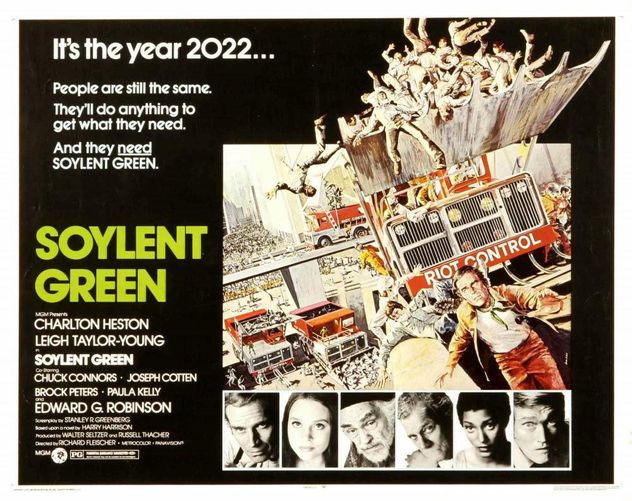Forty eight years ago, a sci-fi thriller predicted a future with all three—in the year 2022.
Peter Dykstra for the Environmental Health News
In
the 70s an often-forgotten film predicted climate change, chaos, and
cannibalism in America's not-so-distant future.
Well,
we're underachieving on the cannibalism, but if you count the coronavirus as
"chaos," we're doing fine on the other two.
Soylent
Green, starring
Charlton Heston, premiered nationwide on May 9, 1973, to mixed
reviews. In a year when The Exorcist and The Sting lapped
the field, its box office take did not make the top 25 films.
Set
in a hungry, desperate New York City beset by pollution, overpopulation, and a
climate where the temperature stays above a humid 90° F, life is so awful that
euthanasia is not only legal, it's often welcomed.
The
year of this future hellscape? 2022.
Aided by Hollywood legend Edward G. Robinson, Heston investigates the murder of one of the city's elite, the CEO of the Soylent Corp. Soylent provides roughly half the world with its nutrition in bland soy-and-lentil wafers marketed as Soylent Red and Soylent Yellow.
When
the tastier, protein-rich Soylent Green hits the market, food riots ensue, and
Heston sleuths the new, secret ingredient.
A
Heston digression
Charlton
Heston's remarkable career is worth a few paragraphs. A World War II veteran,
he built a strong Hollywood resume as a 1950's action hero. But Heston became
Hollywood royalty through three Judeo-Christian-based epics: He parts the Red
Sea in The Ten Commandments (1956); ruins the chariot-racing
Romans in Ben-Hur (1959); and trolls the Son of God in The
Greatest Story Ever Told (1965).
Meanwhile,
Heston became a liberal Hollywood icon by stumping for the Civil Rights Act,
and, in 1968, in favor of gun control. And his signature film work took an
abrupt turn from a biblical past to a dystopian future.
Planet
of the Apes (1968)
starred Heston as an astronaut inadvertently propelled into a future where
apes, chimps and orangutans dominate, thanks to evolutionary changes brought on
by nuclear war. The box office smash also devolved into four sequels, two
short-lived TV series, two remakes, and two more sequels.
Soylent
Green never
rated any sequels, but it preceded an abrupt political turn by Heston, who
spent the last decades of his life as a conservative icon and president of the
National Rifle Association.
"We have met the entrée, and he is us."
And
now, back to Soylent Green ...
The
movie may have sounded ominous warnings about climate change on filthy
Manhattan streets, but it also depicted young women as "furniture" at
the disposal of the rich.
Clean
air and water, overconsumption, resource exhaustion and other 21st century themes
abound in this clumsy, dated film.
Oh,
and did Mr. Heston ever figure out the secret to Soylent Green's high-protein
success? To paraphrase the 20th Century swamp philosopher Pogo, "We have
met the entrée, and he is us."
Yes,
as Heston shrieks at movie's end, "Soylent Green is people!"
Or,
as modern-day talkshow guests are so fond of saying, "Thanks for having
me."
Peter
Dykstra is our weekend editor